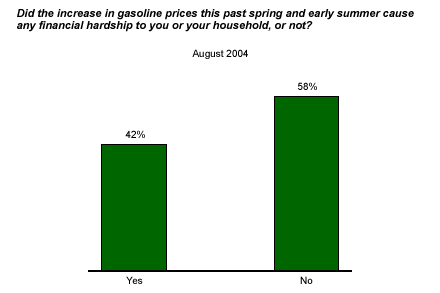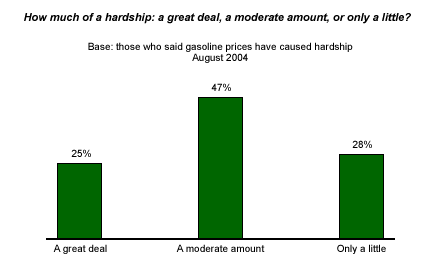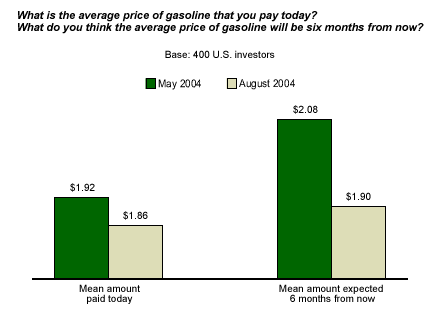How do U.S. investors feel about today's high energy costs from an investment perspective? Pretty troubled. Roughly 9 in 10 investors say that the price of energy is hurting the current investment climate. According to the August UBS/Gallup Index of Investor Optimism survey*, 62% of investors feel that energy costs are hurting the investment climate "a lot" and another 27% say they are hurting it "a little." Of the 11 issues tested in the poll, investors are most likely to say that energy costs are hurting a lot. In stark contrast, "uncertainty over the presidential election" ties for ninth out of the 11 investor concerns.
Today's gas prices reflect higher energy costs. The new UBS/Gallup poll provides key investor insight into where gas prices are headed, and how those prices are affecting the economic outlook.
Financial Hardship Because of Gas Prices
Forty-two percent of investors say that the increase in gas prices this past spring and early summer has caused them financial hardship. Of those who have encountered hardship, 25% say gas prices have caused a great deal of hardship and another 47% say they have caused a moderate amount of hardship.


Price Expectations
In May 2004, investors told Gallup that they were paying an average price of $1.92 for a gallon of gas and were expecting gas prices to average $2.08 in six months. So far, this seems like a good projection given where average gas prices peaked earlier this summer.
Investors now say they are paying an average of $1.86 per gallon for gas. Six months from now, they expect to be paying $1.90 per gallon.

An Immediate-Term Surge in Gas Prices
Clearly there is often some lag between an increase in oil prices and an escalation of gas prices, although the two frequently seem to increase in concert. Recently, oil prices have surged over $49 a barrel, and while they may fluctuate, many market participants forecast they will soon hit $50. Barring a drawdown on the strategic oil reserve or some similar dramatic action, another surge in gas prices -- a lagged response to soaring oil prices -- seems inevitable in the weeks ahead.
It's possible that consumers, investors, and businesses fully anticipate such a gas price surge. Investors may believe the price surge will be short-lived and prices will drop back to their current range six months from now. But I don't think that is the case.
It's likely that most people think another surge in gas prices would be disastrous for the economy and the president's re-election campaign, and they assume that the administration will find some way to avoid this outcome. If my speculation is correct, then a surge in gas prices in the near term would be a major shock to the economy and the markets.
Bottom Line
In my view, higher gas and energy prices are having essentially the same economic impact that a significant and regressive tax increase would have. While a substantial tax cut boosted last year's economic expansion, this year's economic momentum could "hit a wall" because of the financial hardship associated with higher energy prices -- particularly if prices at the pump surge and the cost of home heating oil does likewise. If 4 in 10 investors say gas prices have caused them financial hardship, the hardship on low- and moderate-income households is probably much greater.
Higher gas prices can only make conditions in an already weak job market worse. Outsourcing of jobs is the second-strongest investor concern of the 11 issues tested, with 55% saying it is hurting the investment climate "a lot." Eleven percent of employed adults** remain worried their companies will move jobs to countries overseas, and one in five are worried they will be laid off. Considering the unstable job market and the added impact of higher gas prices, I find it hard to share the optimism of the Bush administration and the Federal Reserve about the economy in the months ahead.
*Results for the Index of Investor Optimism -- U.S. are based on telephone interviews with a randomly selected U.S. sample of 804 adult investors, aged 18 and older, with at least $10,000 of investable assets, conducted Aug. 1-15, 2004. For results based on this sample, one can say with 95% confidence that the maximum error attributable to sampling and other random effects is ±4 percentage points. In addition to sampling error, question wording and practical difficulties in conducting surveys can introduce error or bias into the findings of public opinion polls.
**Results are based on telephone interviews with 1,017 national adults, aged 18 and older, conducted Aug. 9-11, 2004. For results based on the total sample of national adults, one can say with 95% confidence that the margin of sampling error is ±3 percentage points.
For results based on the sample of 580 adults employed full or part time, the maximum margin of sampling error is ±4 percentage points.
